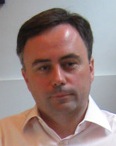John Graham-Cumming | |
|---|---|
 John Graham-Cumming in 2010 | |
| Alma mater | University of Oxford (DPhil) |
| Known for | POPFile The Geek Atlas [1] |
| Scientific career | |
| Institutions | Cloudflare (Board of Directors) [2] Cloudflare (Former CTO) [3] Electric Cloud [4] |
| Thesis | The formal development of secure systems (1992) |
| Doctoral advisor | Jeff W. Sanders |
| Website | www |
John Graham-Cumming is a British software engineer and writer [5] best known for starting a successful petition to the Government of the United Kingdom asking for an apology for its persecution of Alan Turing. [6] UK Prime Minister Gordon Brown issued the apology in September 2009. [7] As of 2025 [update] , Graham-Cumming is a member of the Board of Directors at Cloudflare, [8] [9] where he previously served as the company's Chief Technology Officer until March 2025. [10] [11] [12] Prior to joining Cloudflare, he co-founded Electric Cloud. [4]